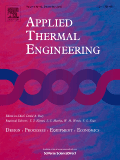
APPLIED THERMAL ENGINEERING
Scope & Guideline
Unveiling the science behind efficient thermal solutions.
Introduction
Aims and Scopes
- Thermal Management Systems:
Research on systems and strategies for managing thermal energy in various applications, particularly in electric vehicles, electronics, and HVAC systems. - Heat Exchangers and Energy Systems:
Development and optimization of heat exchangers, including innovative designs and materials, to improve energy transfer efficiency in thermal systems. - Phase Change Materials (PCMs):
Investigation of PCMs for thermal energy storage and management, focusing on their integration into building systems, batteries, and renewable energy applications. - Geothermal and Renewable Energy Applications:
Studies on utilizing geothermal energy and other renewable sources for efficient thermal energy production and distribution. - Computational Fluid Dynamics (CFD) and Modeling:
Application of CFD and other modeling techniques to simulate thermal processes, optimize designs, and predict performance in thermal systems. - Nanofluids and Advanced Materials:
Research on the use of nanofluids and advanced materials to enhance heat transfer properties and efficiency in thermal applications.
Trending and Emerging
- Sustainable Energy Systems:
Increasing research on sustainable and renewable energy systems, including solar thermal applications, biomass energy, and hybrid systems that combine various energy sources. - Advanced Thermal Management for Electric Vehicles:
A significant rise in studies focusing on thermal management systems for electric vehicles, emphasizing battery cooling and energy efficiency. - Artificial Intelligence and Machine Learning Applications:
Emerging applications of AI and machine learning techniques in modeling and optimizing thermal systems, enhancing predictive capabilities, and improving operational efficiency. - Nanotechnology in Thermal Applications:
Growing interest in the use of nanomaterials and nanofluids to enhance thermal properties and efficiencies in various thermal systems. - Integrated Energy Systems:
Research on integrated energy systems that combine heat, power, and cooling generation, focusing on efficient utilization and management of resources. - Thermal Energy Storage Solutions:
Increasing exploration of innovative thermal energy storage solutions, particularly using phase change materials and thermochemical processes for energy management.
Declining or Waning
- Conventional Refrigeration Techniques:
Research in conventional refrigeration methods has decreased as interest shifts towards more environmentally friendly alternatives and advanced systems like CO2 and ammonia-based refrigeration. - Basic Heat Transfer Principles:
Fundamental studies on heat transfer principles are becoming less prominent as the field moves towards more complex applications and innovative technologies. - Thermal Energy from Fossil Fuels:
Interest in thermal energy systems reliant on fossil fuels is waning in favor of renewable energy solutions and sustainable practices. - Low-complexity Thermal Systems:
There is a decreasing focus on low-complexity thermal systems as the industry demands more integrated and sophisticated solutions for energy efficiency.
Similar Journals
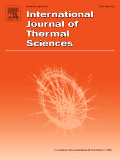
INTERNATIONAL JOURNAL OF THERMAL SCIENCES
Innovating research in thermodynamics and engineering.The INTERNATIONAL JOURNAL OF THERMAL SCIENCES is a premier academic journal published by ELSEVIER FRANCE-EDITIONS SCIENTIFIQUES MEDICALES ELSEVIER, focusing on cutting-edge research in the field of thermal sciences. With its ISSN 1290-0729 and E-ISSN 1778-4166, this journal has established itself as a crucial resource for scholars and professionals interested in the thermodynamic principles governing engineering and condensed matter physics. The journal is ranked Q1 in both Condensed Matter Physics and Engineering (miscellaneous), highlighting its exceptional quality and influence, as reflected in its impressive Scopus ranks: #32 out of 307 in General Engineering (89th percentile) and #57 out of 434 in Condensed Matter Physics (86th percentile). Researchers and students alike can benefit from the wealth of articles available, with access options designed to foster a wider dissemination of knowledge within the scientific community. Established in 1973 and ongoing through 2025, the journal invites contributions that advance the understanding of thermal phenomena and their applications, solidifying its importance in driving innovation and insight within these dynamic fields.
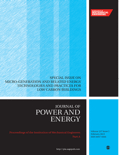
PROCEEDINGS OF THE INSTITUTION OF MECHANICAL ENGINEERS PART A-JOURNAL OF POWER AND ENERGY
Transforming Ideas into Energy SolutionsPROCEEDINGS OF THE INSTITUTION OF MECHANICAL ENGINEERS PART A-JOURNAL OF POWER AND ENERGY, published by SAGE PUBLICATIONS LTD, is a pivotal journal dedicated to advancing the fields of mechanical engineering and energy technology. With a history spanning from 1983 to 2024, this journal provides a respected platform for researchers and practitioners to disseminate findings that address contemporary challenges in power generation, energy efficiency, and sustainable engineering practices. As evidenced by its quarter ranking in Q3 within the categories of Energy Engineering and Power Technology, and Mechanical Engineering, it serves as a significant resource for academics aiming to enhance their understanding and explore innovation in these critical areas. While currently not an open-access journal, the research published here is invaluable for both ongoing education and professional practice, making it an essential read for anyone engaged in the engineering disciplines.
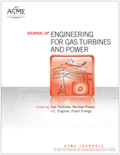
JOURNAL OF ENGINEERING FOR GAS TURBINES AND POWER-TRANSACTIONS OF THE ASME
Connecting Academia and Industry in Energy InnovationJournal of Engineering for Gas Turbines and Power - Transactions of the ASME, published by the esteemed American Society of Mechanical Engineers (ASME), is a leading interdisciplinary journal dedicated to advancing the fields of energy engineering, aerospace, nuclear energy, and mechanical engineering. With an impressive history dating back to 1960 and continuing its contributions through 2024, this journal boasts a Q2 ranking in multiple engineering categories, reflecting its strong impact on both academia and industry. Although not an open-access journal, it provides invaluable insights and research findings that cater to the needs of professionals, researchers, and students alike. The journal's ISSN is 0742-4795 with an E-ISSN of 1528-8919, ensuring widespread visibility in the global academic community. Indexed in Scopus, it ranks notably within its fields—21st in Nuclear Energy and Engineering and 51st in Aerospace Engineering—underscoring its relevance and contribution to critical technological advancements. Researchers in this domain will find the journal a vital resource for innovative studies, practical applications, and the latest developments related to gas turbines and power generation.

Frontiers in Heat and Mass Transfer
Exploring Innovative Research in Heat and Mass TransferFrontiers in Heat and Mass Transfer is a premier open-access journal published by TECH SCIENCE PRESS that focuses on the interdisciplinary field of heat and mass transfer. Established in 2010, this journal has been pivotal in disseminating high-quality research aimed at advancing the understanding of energy and material transport phenomena. With an impressive commitment to open access, it ensures that all published articles are readily available to researchers, practitioners, and students globally, promoting knowledge sharing and collaboration. The journal currently holds a Q3 ranking in key categories such as Engineering, Materials Science, and Physics and Astronomy, as well as notable positioning in Scopus rankings. With a forward-looking scope extending from 2010 to 2024, Frontiers in Heat and Mass Transfer continues to be an essential platform for innovative research, fostering the development of practical applications across various scientific and engineering domains. We invite you to explore the latest contributions to this evolving field and consider this journal as a vital resource for your academic and professional growth.
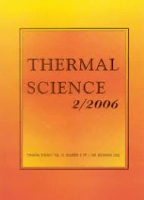
Thermal Science
Bridging research and practice in the realm of thermal science.Thermal Science is an esteemed open-access journal published by the Vinca Institute of Nuclear Sciences in Serbia. With a rich focus on the field of thermal science, this journal has established itself as a vital resource for researchers and professionals interested in the dynamics of energy, renewable energy systems, and environmental sustainability. Since its inception in 2001, Thermal Science has dedicated itself to disseminating high-quality research that addresses the challenges of contemporary thermal technologies. The journal has converged its years of publication from 2007 to 2024 and currently holds a Q4 ranking in the category of Renewable Energy, Sustainability, and the Environment, with a Scopus rank of #172 out of 270, placing it in the 36th percentile. This makes it a crucial platform for sharing innovations and findings that contribute to the development of sustainable energy solutions. With open access options available, Thermal Science ensures that knowledge is readily accessible, fostering collaboration and advancement in this critical field.

Journal of Thermal Science
Fostering groundbreaking research in thermal applications.Journal of Thermal Science is a prestigious academic publication dedicated to the field of thermal science and its applications. Published by SPRINGER, this journal has been at the forefront of knowledge dissemination since its inception in 1992 and continues to provide a platform for researchers and professionals to share their innovative findings through high-quality peer-reviewed articles. With its ISSN 1003-2169 and E-ISSN 1993-033X, the journal covers a diverse array of topics related to thermal processes, materials, and engineering, significantly contributing to advancements in Condensed Matter Physics. In the latest rankings, it holds a commendable Q2 category in the 2023 quartiles, further highlighting its relevance with a Scopus ranking of #183/434 in its field, placing it in the top 57th percentile. While currently not offering open access, the journal strives to bridge the gap between theory and practice, making substantial impacts on both academia and industry. Its continued exploration of cutting-edge research ensures that it remains a key resource for students and professionals looking to expand their knowledge and foster innovation in thermal sciences.

Journal of Engineering Thermophysics
Pioneering research at the intersection of thermophysics and engineering.Journal of Engineering Thermophysics, published by PLEIADES PUBLISHING INC, is a premier academic journal dedicated to advancing the field of thermophysics and its applications across a variety of engineering disciplines. With an ISSN of 1810-2328 and an E-ISSN of 1990-5432, this journal offers an essential platform for researchers and professionals to disseminate cutting-edge findings on the interplay between thermal processes and engineering systems. As of 2023, it is recognized within the Q3 category in key fields such as Condensed Matter Physics, Energy Engineering and Power Technology, Environmental Engineering, and Modeling and Simulation. Moreover, the journal contributes to an important dialogue in the environmental sciences, ranking 111 out of 197 in Environmental Engineering, and positions itself prominently within the academic landscape from its establishment in 2007. Although currently not an open-access journal, it facilitates a selective yet impactful communication of research that drives innovation and knowledge in the thermal sciences. For those engaged in understanding the thermal dynamics essential for sustainable engineering solutions, the Journal of Engineering Thermophysics is the go-to resource for published research, reviews, and advancements in the field.

ISI Bilimi ve Teknigi Dergisi-Journal of Thermal Science and Technology
Unveiling Breakthroughs in Thermal MethodologiesISI Bilimi ve Teknigi Dergisi-Journal of Thermal Science and Technology, published by the Turkish Society of Thermal Sciences and Technology, serves as a pivotal platform for disseminating cutting-edge research in the fields of thermal science, engineering, and materials science. With an ISSN of 1300-3615, this journal not only addresses critical advancements from 2008 to 2013 and 2015 to 2023, but also operates under the auspices of rigorous peer review, contributing to its reputable standing in academia. As a Q4 ranked journal in various disciplines including Atomic and Molecular Physics, Engineering, and Materials Science, it offers researchers and professionals essential insights, though it does not currently operate under an open access model. Situated in Ankara, Turkey, this journal is key to fostering collaboration and innovation among scholars, making it an indispensable resource for students and professionals eager to engage with the latest thermal science methodologies and technologies.

International Journal of Turbomachinery Propulsion and Power
Transforming ideas into innovations in propulsion technology.The International Journal of Turbomachinery Propulsion and Power, published by MDPI, is a pivotal scholarly platform devoted to advancing the field of turbomachinery, propulsion technology, and power systems. Since its inception in 2016, this open-access journal has provided an invaluable resource for researchers, professionals, and students within the realms of Aerospace Engineering, Energy Engineering, and Mechanical Engineering. With its current ranking in the Q3 category across these disciplines and its strategic placement in Scopus, the journal facilitates the dissemination of cutting-edge research findings and innovative solutions. The commitment to open access, effective from 2017, ensures that high-quality research is readily accessible, fostering collaboration and knowledge sharing in the global academic community. As it continues to expand its scope through 2024, the journal remains a crucial avenue for discussion, experimentation, and advancement in turbomachinery and energy-related studies.

Archives of Thermodynamics
Pioneering Research in Thermodynamic SystemsArchives of Thermodynamics is a reputable journal dedicated to the field of thermodynamics, published by the esteemed POLISH ACADEMY OF SCIENCES. With a robust history since its inception in 2003, this journal serves as a critical platform for disseminating high-quality research aimed at advancing knowledge and technology in thermodynamic systems and processes. Recognized for its contribution to the field, it holds a Q3 ranking in the Physics and Astronomy (miscellaneous) category as of 2023, with a respectable Scopus rank of #148 out of 243, placing it within the 39th percentile. Although it follows a traditional access model, the journal's commitment to scholarly excellence ensures that researchers, professionals, and students alike can benefit from its rich archives and ongoing discussions within the scientific community. Situated in Warsaw, Poland, the journal not only reflects a regional dedication to scientific progress, but also engages with global audiences interested in the evolving landscape of thermodynamic research.